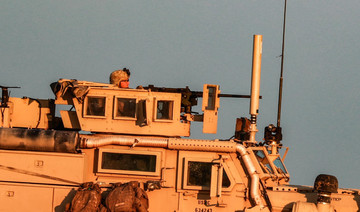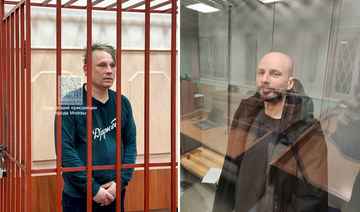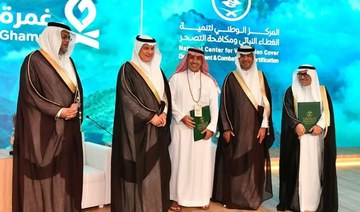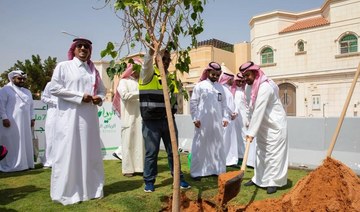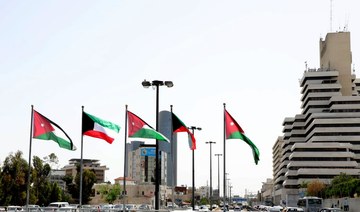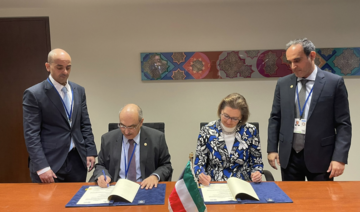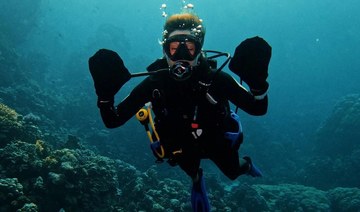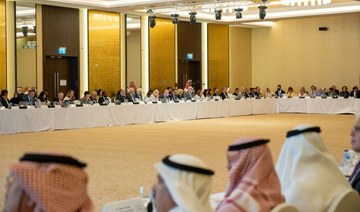TEHRAN: Iran’s government faces acute economic challenges as it announces its annual budget, expected on Tuesday, and not all of its problems are the result of US sanctions.
The rial has lost around half its value against the dollar since US President Donald Trump announced he was withdrawing from the 2015 nuclear deal in May and reimposing sanctions.
That has driven up prices and blocked much of the foreign investment President Hassan Rouhani had hoped to attract, with the International Monetary Fund now predicting the economy will shrink by 3.6 percent next year.
But analysts say many of the country’s woes pre-date Trump and the sanctions.
Iran-based economist Mohammad Mahidashti says the banking system is the “biggest problem — riddled with fictitious assets and non-performing loans.”
Banks issued huge loans under Rouhani’s predecessor Mahmoud Ahmadinejad with little apparent care for whether they would be repaid.
Parliament’s economic commission said in March that half of all these loans — worth around $27 billion at the time — turned sour.
Desperately short of funds, banks have tried to attract fresh deposits with interest rates of 30 percent or more.
While providing a much-needed source of liquidity initially, the interest on these deposits has only added to banks’ instability.
Rouhani said recently that “unhealthy” banks were being kept afloat by continuously borrowing from the central bank, and the debts of private lenders have doubled in the year to September.
Banks are also saddled with unsellable properties after pumping cash into a construction boom that ran out of steam around 2013.
“We have close to two million empty houses in Iran. There is simply no demand out there,” said Narges Darvish, an economics lecturer at Tehran’s Alzahra University.
But the government is loath to let banks fail, fearing a public backlash — especially after the collapse of dodgy credit agencies helped fuel widespread protests a year ago.
The US withdrawal from the nuclear deal fueled a run on the Iranian rial, but was not the only factor behind the currency’s weakness.
In September, central bank governor Abdolnasser Hemmati instead blamed “horrific growth in money supply.”
Its data shows that the amount of cash flowing around the Iranian economy has increased 24 percent annually for the past four years.
Given that Iran’s economy offers few profitable and secure investment opportunities, citizens had already long sought to change rial savings into dollars.
And when rising expectations that the US would re-impose sanctions pressured the rial in earnest in early 2018, the government’s reaction was a mess, according to economist Mousa Ghaninezhad.
“They claim they believe in the free market but they have no coherent strategy,” he told AFP.
At one point, in April, the government forcibly shut down exchange houses and tried to fix the rate at 42,000 rials per dollar — which only fueled panic and drove speculators into the black market.
Recognizing its mistake, the government reopened exchange shops and sacked the central bank governor a few months later.
A fierce crackdown was also unleashed on those exploiting the situation, with dozens of traders put on trial and at least three businessmen executed since October.
But the damage has been done. Imports are now vastly more expensive at the same time as sanctions make it harder to move goods into the country.
Prices have been rising as a result — the cost of food and drink rose 60 percent in the year to November, according to the central bank.
Despite a privatization drive, much of the economy remains in the hands of the state, either directly, or because groups connected to the government or military are the major shareholders.
This has stifled the private sector, which struggles to attract investment and compete for projects, analysts say.
Economist Ehsan Soltani says state-controlled industries like steel and petrochemicals benefit from huge subsidies — totalling around $40 billion (35 billion euros) a year in fuel and electricity discounts — but create relatively few jobs and returns.
“These industries are only wanted because of rent and corruption,” he told AFP.
Hopes that the nuclear deal would bring a flood of foreign investment to boost the private sector have been dashed by the return of sanctions.
Meanwhile, efforts to bring greater transparency — notably, new laws against money-laundering — have been opposed by powerful vested interests, according to Foreign Minister Mohammad Javad Zarif.
“Those places that launder thousands of billions (of rials) are certainly financially capable of spending a few hundred billion on propaganda (against the laws),” Zarif told Khabar Online news agency last month.
Iran’s economic woes go beyond sanctions
Iran’s economic woes go beyond sanctions
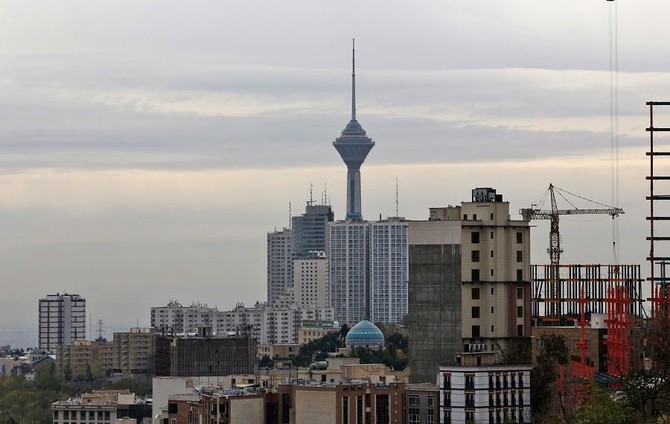
- Banks issued huge loans under Rouhani’s predecessor Mahmoud Ahmadinejad with little apparent care for whether they would be repaid
- Desperately short of funds, banks have tried to attract fresh deposits with interest rates of 30 percent or more
Russia charges journalist with ‘justifying terrorism’
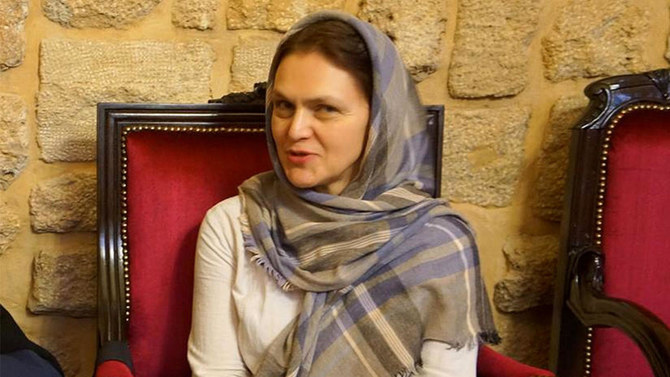
- Nadezhda Kevorkova was arrested for two Telegram posts regarding an Islamist raid and Afghanistan, her son reports
- The journalist specialized in coverage of the Middle East
MOSCOW: Russia has detained prominent journalist Nadezhda Kevorkova and charged her with “justifying terrorism” over posts on her Telegram account, her lawyer said Monday.
Kevorkova, 65, wrote for a number of outlets including Novaya Gazeta and Russia Today and specialized in coverage of the Middle East, including the Israeli-Palestinian conflict.
“Nadezhda Kevorkova has been detained and will be taken to a temporary detention center today. The matter of pre-trial restrictions will be decided tomorrow,” lawyer Kaloy Akhilgov said.
The charges relate to two posts on her Telegram from 2018 and 2021, one a re-post from another journalist about the 2005 Islamist raid on Nalchik and the other about Afghanistan, he said.
The raid on Nalchik, a city in Russia’s North Caucasus, saw armed Islamist militants target government and security buildings in an attack that left dozens of people dead.
Her ex-husband Maxim Shevchenko, who presents a talk show on state television, rejected the charges against her.
“Nadezhda Kevorkova never justified terrorism and never justified the attack on Nalchik ... but as a journalist, she certainly wrote about torture during the investigation,” he said.
Russia has waged an unprecedented crackdown on freedom of the press since launching its full-scale offensive in Ukraine, silencing and detaining journalists at odds with the Kremlin.
‘Kingdom aims to lead in global efforts to combat climate change,’ says Saudi’s climate envoy

- Adel Al-Jubeir speaks of cementing country’s role in global community
RIYADH: The inaugural National Greening Forum, which was organized by the National Center for Vegetation Cover Development & Combating Desertification, took place in Riyadh on Monday to look at the Kingdom’s efforts in afforestation and combating climate change.
Adel Al-Jubeir, the Kingdom’s climate envoy and Saudi minister of state for foreign affairs, took to the stage to speak of cementing the country’s role within the global community.
He said: “Climate and afforestation are part of the Kingdom’s policy regarding dealing with climate change and the environment.

“This is a big part of Vision 2030 in terms of quality of life. The Kingdom is part of the international community. Anything that happens globally affects the Kingdom, and vice versa.
“Having clean air and a healthy environment matters to that community, and afforestation is part of facing climate change.”
The minister added that drought had historically caused conflicts, population displacement, and health issues which had made land rehabilitation crucial not only for the environment but also for global stability, security, and quality of life.
Al-Jubeir said: “As the largest exporter of oil globally, the Kingdom feels a responsibility towards the climate, and its goal is to become the leading nation in this sector, and not a country which follows global standards. We need to set these standards.”
The envoy recently attended the World Economic Forum Special Meeting, hosted for the first time by the Kingdom in Riyadh, which discussed opportunities for global collaboration and growth. He said that the Kingdom’s participation was a clear sign of its pivotal role in confronting international challenges.
He added: “Climate is related to multiple sectors, including the economy. Floods and natural disasters cause a rise in the price of goods, impact machinery and delivery trucks, which also alters delivery periods and costs, and also impacts the consumer. These things are directly correlated to our everyday lives, not just locally but globally.”
He said that nature-based solutions were pivotal points of discussion at global platforms like the World Economic Forum, adding that the world needs further collaboration to combat such issues sustainably.
He said: “I think there must be conviction with this challenge. There are differences in how to reach the desired goal between developed and developing countries, but I do not think that there is any country that opposes reaching this goal.”
The Kingdom believes the issue should be dealt with comprehensively and logically, taking into consideration such factors as afforestation, minimizing consumption, technological development, carbon capture methods, rehabilitation, and establishing nature reserves.
Al-Jubeir said: “For example, European countries are concentrating on hydrocarbons, petrol, and gas, but they forget animals, industry, cement, and chemicals.”
The National Greening Forum saw the inauguration of the Discover Nature program which invites environmental experts and enthusiasts to discover, document, and learn. The Saudi Green Initiative is also well on its way to achieving its ambitious target of growing 10 billion trees, reflecting the Kingdom’s commitment to addressing its environmental challenges and improving quality of life.
The minister emphasized that awareness, knowledge, and achieving objectives were at the heart of these initiatives.
He added: “Sustainability isn’t just planting a tree; it needs follow-up and care for it to grow. It’s a continuous act, not just a one shot.”
Kuwait, EU discuss cooperation on renewable energy, climate change
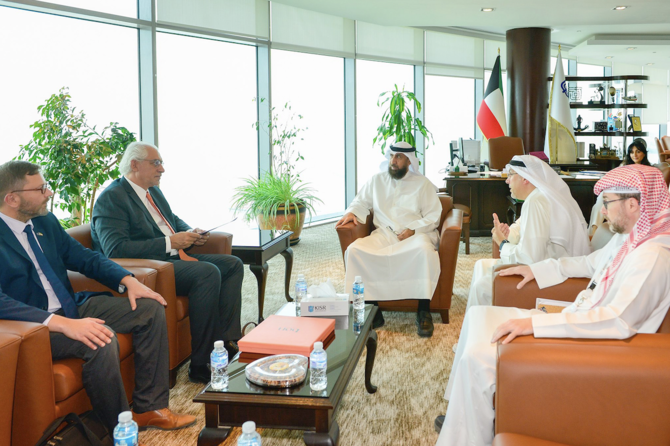
- Two underscored the pivotal role of the private sector in realizing clean energy objectives under international treaties
LONDON: The Kuwait Institute for Scientific Research on Monday held discussions with an EU delegation about enhancing cooperation in renewable energy, climate change and addressing international environmental challenges.
Mashaan Al-Otaibi, acting director-general of KISR, met with Spyros Kouvelis, representing the European Commission’s Gulf Cooperation Council-EU project on green transition.
The two underscored the pivotal role of the private sector in realizing clean energy objectives outlined in international treaties, Kuwait News Agency reported.
Al-Otaibi highlighted Kuwait’s vision of improving the business environment through its green transition project as a means to achieve these objectives.
He said that this was crucial for enabling renewable energy solutions, fostering regional cooperation, and taking strides toward a sustainable future while mitigating the effects of climate change.
In response, the EU official reiterated the significance of bolstering collaboration between international organizations, such as the EU, the UN, and GCC countries through green transition projects.
Red Sea Global unveils Shura Links golf course designs
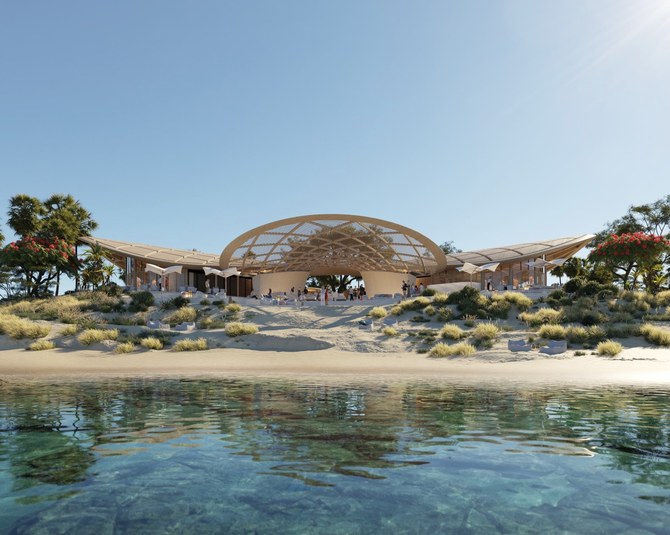
- Designs developed in collaboration with leading environmental consultants
RIYADH: Red Sea Global has officially unveiled the designs for its golf course and clubhouse on Shura Island, set to be completed and fully operational by 2025.
Shura Links will be Saudi Arabia’s inaugural 18-hole island golf course, with holes overlooking the water and fairways framed by the Red Sea.
Developed in collaboration with leading environmental consultants, it will adhere to strict sustainability standards, with a focus on areas such as water conservation.
The course will minimize water consumption through turf grass selection and soil sensors, and there will be innovative irrigation technology in place. Foliar feeding will preserve the turfgrass quality. As only 20 percent of the 140-hectare site will be dedicated to maintained turf, this will allow for a very natural environment.
The course has been designed in partnership with world-renowned golf architect Brian Curley, the designer behind the world's largest golf facility, Mission Hills Golf Club.
“There are very few places in the world that can offer year-round sunshine, stunning vermilion sunsets and a wonderfully natural design. Shura has it all,” Curley said.
“We expect everyone from professionals to beginners to be drawn to this unique course and have designed it accordingly.”
The course will span a championship length of 7,500 yards, with multiple tees and experiences at each hole. Holes four to seven will trace the coastline, while holes 14 to 18 provide a dramatic finish against the backdrop of the sea.
The clubhouse, designed by Foster + Partners, follows the overall Coral Bloom design concept on Shura Island.
Red Sea Global is developing a habitat development and protection plan to support wildlife on the island, exploring the potential of using the course’s irrigation system to foster mangrove growth.
Saudi officials hold talks with UK’s Africa, development minister
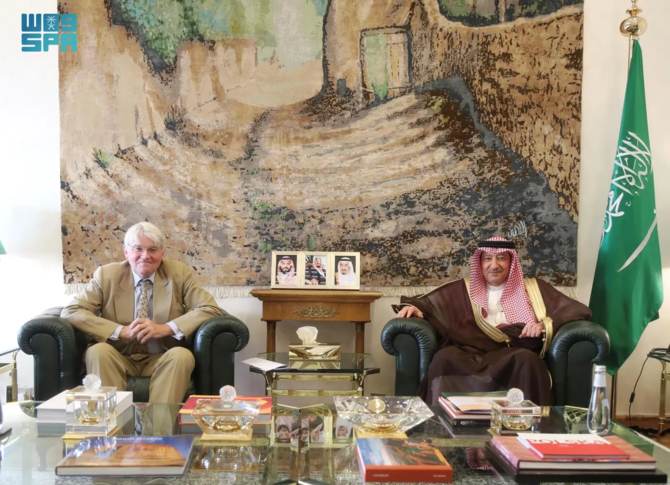
RIYADH: Saudi Arabia’s Deputy Foreign Minister Waleed Elkhereiji on Tuesday received UK Minister of State for Development and Africa Andrew Mitchell in Riyadh.
The two sides discussed topics of common interest and ways to strengthen relations between their countries, the foreign ministry said.
The UK’s Ambassador to the Kingdom Neil Crompton also attended the meeting.
Elkhereiji also held talks with the British Special Envoy for the Red Sea and the Horn of Africa, Sarah Montgomery, and her delegation. The two sides discussed prominent regional and international developments.
Saudi Minister of State for Foreign Affairs and Envoy for Climate Affairs Adel Al-Jubeir also received Mitchell at the ministry’s office in Riyadh to review various regional and international issues of mutual concern.
During his visit, Mitchell is also expected to meet with the CEO of the Saudi Fund for Development, Sultan Al Marshad, and Assistant Finance Minister and G20 Sherpa Abdulmuhsen Al Khalaf.



